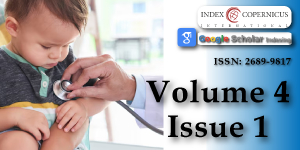Effects of food programme for enhancing obesity children healthy of their abilities and expectations to self-efficacy for preventing early childhood
Main Article Content
Abstract
This study aims to assess parents’ perceptions of their responses to the perceived awareness programme competency abilities and expectations for enhancing parents on weight control of their pre-school children in preventing with Obesity. It has defined self-efficacy as one’s belief in one’s ability to succeed in specific situations and accomplish a task with the theoretical framework of Bandura’s Model by quasi-experimental research in 16 weeks. To promote the self-efficacy and expectations, the 10-item Questionnaire on Self-Efficacy Program, the 22-item Questionnaire on Parents’ Efficacy Interaction, and the 46-item Questionnaire on Parental Expectations assessed parents’ perceptions. A sample size consisted of 14-pre-school children whose age ranged 2-5 years old at the Child Development Demonstration Centre, Khon Kaen University was selected. Providing knowledge, teaching, demonstration, experimentation, and organized activities were organized. Parents’ perceptions of their abilities for controlling children’s weight and height with pre- and post-experimental programmes differentiated, significantly. Parents’ responses to the post performances are over than pre-experiment for the QSEP, the QPEA, and the QPE, differently. They answered and followed up on child management with parents online for 16 weeks, continuously. The obese early childhood at the CDC Demonstration Centre, Faculty of Nursing used the food programme to self-efficacy with their parents taking part and cooperating well in specifying research objectives. There are 2,958,441 children in rural areas are lacking attention, because of food and health problems in the 19,171-Child Development Centres none yet have food programmes to prevent health and hygiene problems. Although Thailand took the next leap forward for its investment in Early Childhood Development through legislation, improved quality services, and social transfer grants for families with young children since 2018.
Article Details
Copyright (c) 2025 Tanwattanakul J, et al.

This work is licensed under a Creative Commons Attribution 4.0 International License.
World Health Organization (WHO). World Health Organization (WHO). Obesity. 2018 https://www.who.int/topics/obesity/en/
World Health Organization (WHO). Obesity and overweight fact sheet N°311. WHO. 2015.
Colquitt JL, Pickett K, Loveman E, Frampton GK. Surgery for weight loss in adults. The Cochrane Database of Systematic Reviews (Meta-analysis, Review. 8: CD003641.
Dibaise JK, Foxx-Orenstein AE. Role of the gastroenterologist in managing obesity. Expert Review of Gastroenterology & Hepatology. 2013; 7: 439–451.
Woodhouse R. Obesity in art: a brief overview. Front Hormone Res. 2008; 36: 271–286.
Haslam DW, James WP. Obesity. Lancet. 2005; 366: 1197–209.
Oxford: OUP Oxford. Obesity. Oxford handbook of medical sciences (2nd ed.). 2011: 180.
Institute of Medicine. Early childhood obesity prevention policies. National Academies Press. 2011.
World Health Organization (WHO). Obesity and overweight. 2020. https://www.who.int/news-room/fact-sheets/detail/obesity-and-overweight
Center for Disease Control and Prevention. Childhood obesity causes & Consequences. https://www.cdc.gov/obesity/childhood/causes.html
Department of Health, Ministry of Public Health. Obesity reveals threatening Thai children. 2018. https://www.thaihealth.or.th/Content/23671
Nokdee C. Obesity reveals threatening Thai children. Thai Health Promotion Foundation. 2014. https://www.thai-health-promotion-foundation/1
Rhee K. The role of parents in preventing childhood obesity. 2008. https://www.aapss.org/news/the-role-of-parents-in-preventing-childhood-obesity/
Bandura A. Self-efficacy: Toward a unifying theory of behavioral change. Psychological Review. 1977; 84: 191 – 215.
Bandura A. Self-efficacy: The exercise of control. New York: Freeman. 1997.
Bandura A. Social cognitive theory of personality. In L.A. Pervin& O. P. John (Eds.), Handbook of Personality: Theory and research. 2nd ed, 1998; 154-196.
Hax G. Self efficacy and work related performance: A Metaanalysis. Psychological Bulletin. 2010; 124: 240-261.
Bandura A, Barbaranelli C. Multifaceted impact of self-efficacy beliefs on academic functioning. Child Development. 1996; 67: 1206-1222.
Bandura A. Moral disengagement: How people do harm and live with themselves. New York: Worth.
Masten AS, Cicchetti D. Developmental cascades: Desired outcomes for children. Development and Psychopathology. 2010; 22: 491–495.
Likert R. A technique for the measurement of attitudes. Arch Psychol. 1932; 22: 55.
Santiboon T. Appropriating characteristics of the 21st century teachers to transform of the Thailand 4.0 policies. African Journal of Pedagogy and Curriculum. 2017; 4: 48-64.
Barlow SE, The Expert Committee. Expert committee recommendations regarding the prevention, assessment, and treatment of child and adolescent overweight and obesity: summary report. Pediatrics. 2018; 120: S164-S192.
Center of Disease Control and Prevention. Childhood Obesity Facts: Overweight & Obesity, Data & Statistics. 2019. https://www.cdc.gov/obesity/data/childhood.html
World Health Organization (WHO). Noncommunicable diseases: Childhood overweight and obesity. 2020. https://www.who.int/news-room/q-a-detail/noncommunicable-diseases-childhood-overweight-and-obesity
Mayo Clinic. Childhood obesity. 2020. https://www.mayoclinic.org/diseases-conditions/childhood-obesity/symptoms-causes/syc-20354827
Department of Health. Preventing childhood obesity: Tips for parents. 2020. https://www.health.ny.gov/prevention/nutrition/resources/obparnts.htm
Lopez-Garrido G. Self-efficacy theory. Simply Psychology. 2020. https://www.simplypsychology.org/self-efficacy.html
Ekim A. The effect of parents' self-efficacy perception on healthy eating and physical activity behaviors of Turkish Preschool Children. Issues in Comprehensive Pediatric Nursing. 2015; 39: 1-13.
Robinson, E, and Sutin, A. R. (2016). Parental perception of weight status and weight gain across childhood. Pediatrics. 137(5), May 2016, e20153957.
Crothers LM, Hughes TL, Morine KA. Theory and cases in school-based consultation: A resource for school psychologists, school counselors, special educators, and other mental health professionals. New York: Routledge, Taylor & Francis Group. 2008.
Wood RE, Bandura A. Social cognitive theory of organizational management. Acad Manag Rev. 1989; 14: 361-384.
Redmond BF. Social cognitive theory components. 2010. https://wikispaces.psu.edu/display/PSYCH484/Social+Cognitive+Theory+Components
Tahmassian K, Moghadam NJ. Relationship between self-efficacy and symptoms of anxiety, depression, worry and social avoidance in a normal sample of students. Iran J Psychiatry Behav Sci. 2011; 5: 91–98.
Gecas V. Self-efficacy and social cognitive theories. 2004. https://wikispaces.psu.edu/display/PSYCH484/7.+Self-Efficacy+and+Social+Cognitive+Theories
Bandura A. Self-efficacy. Encyclopedia of Human Behavior. 1994; 4: 71-81.
Hong SA, Mongkolchati A, Chompikul J, Mo-Suwan L, Choprapawon C. Comparison of Prevalence of Nutritional Status of Thai Children in the First 2 Years of Life Using National and International Growth Charts. J Med Assoc Thai. 2016; 99: 58-64.
Nestle: Good Food, Good Lift. The appropriate height for your kids. 2015. https://www.nestle.co.th/en/nhw/news/the-appropriate-height-for-your-kids
Nevid JS. Psychology: Concepts and applications (3rd ed.). Boston: Houghton Mifflin Company. 2009.
Locke EA, Latham GP. Building a practically useful theory of goal setting and task motivation: A 35-year odyssey. American Psychologist. 2002; 57: 705-717.

